I was at a conference on cryptocurrency & blockchain in Miami Beach last month. I was the guest of the company IOHK, which is developing blockchain technology. Don’t worry if you don’t know what blockchain is, I barely know myself.
One of the treats of going to the con was that my old friend Stephen Wolfram was there. I met him around soon after he published his epic and revolutionary article in Scientific American in 1984, with the seemingly innocuous title: “Computer Software in Science and Mathematics.” Bascially it was meeting Wolfram that got me to change my field of study from Mathematics to Computer Science, with a special focus on Cellular Automata.
Eventually, in 2002, Wolfram published his great tome, A New Kind of Science, and I followed up in 2005 with my own great tome, expressing some of the same ideas, The Lifebox, the Seashell, and the Soul.
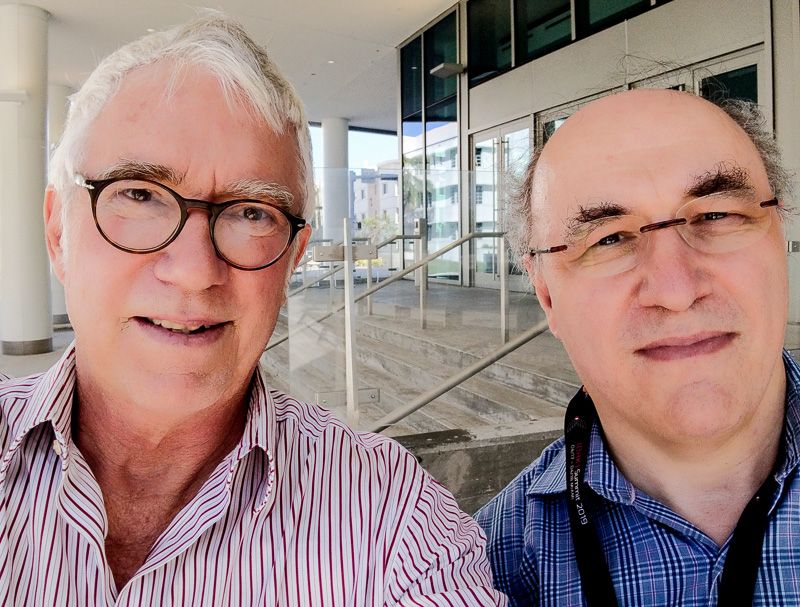
“I always feel odd when I’m a guest at conference like this,” Stephen said to me. “Like I’m a hired dancing girl.” I had the same feeling. But it was fun to make the trip, and to force myself to talk about things I don’t really know about, and I had a chance to tape a good podcast with Stephen.
Listening to my tape of the podcast, I feel sorry for myself—how eager and relieved my voice is at the start. And, towards the end, I hear my undertone of sadness at how rare it is to talk to anyone as smart as Wolfram. He’s someone who continually gets what I’m talking about. Like it was during those golden hours when I met with Kurt Gödel in my twenties.
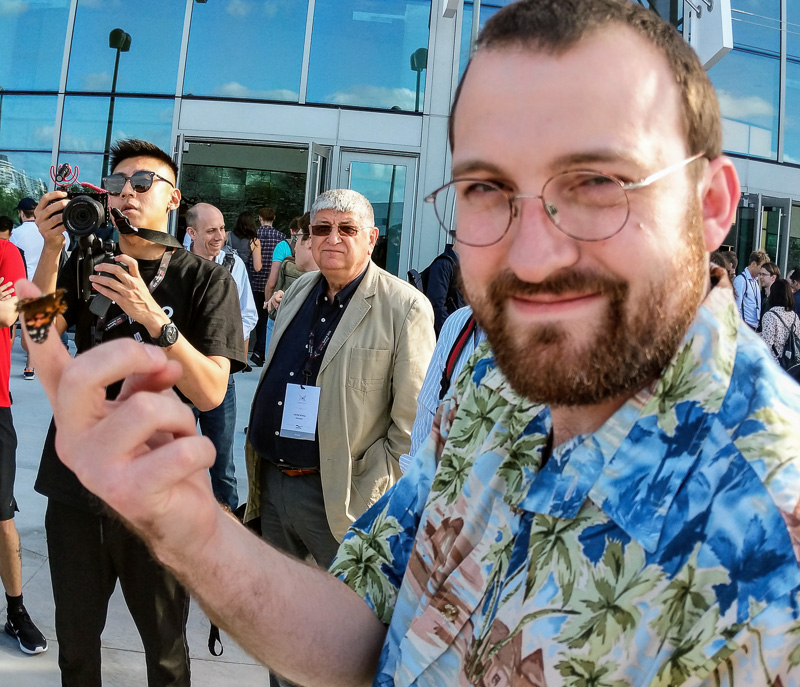
Mainly Wolfram and I were there because Charles Hoskinson, the head of IOHK, is fond of our work. He treated us well.
Although IOHK stands for “Input Output Hong Kong,” the base is in fact in Colorado, and some of their tech division is in Edinburgh, Scotland.
“We put Hong Kong in the name because we thought we’d have a lot of business in Asia,” Charles Hoskinson told me. They seem currently to be focused on business in third world countries, though. There’s an idea that with blockchain you coule bring reliable banking and registration services to countries that never had that. Like bringing wireless phone service into a country that never had landlines. Hopscotching..
IOHK has several interlocking software platforms or code suites: Emrugo, Ada, Cardano, Daedalus, Ethereum, and, now, Atala. My guess is that they’re presently in “burn mode,” that is, spending money on developing their system and evangelizing for wide adoption, with hopes of an eventual IPO.
None of those techs seemed to have heard of Charles Stross, nor of his notion of a population of AI biz bots called “Business 2.0.” In Stross’s Accelerando, Business 2.0 destroys the global economies.

I was incredibly nervous. I gave a talk called “Cyberpunk Use Cases,” relating the history of cyberpunk writing and culture to the liberation of computer software and the escape from dominant silo-building behemoths in the internet. I taped my talk on my own recorder, and I turned on the recorder before the talk, walking around backstage, recording my pre-talk environment, which gave my reality a larger-than-life feel…like I was watching a documentary of my life.
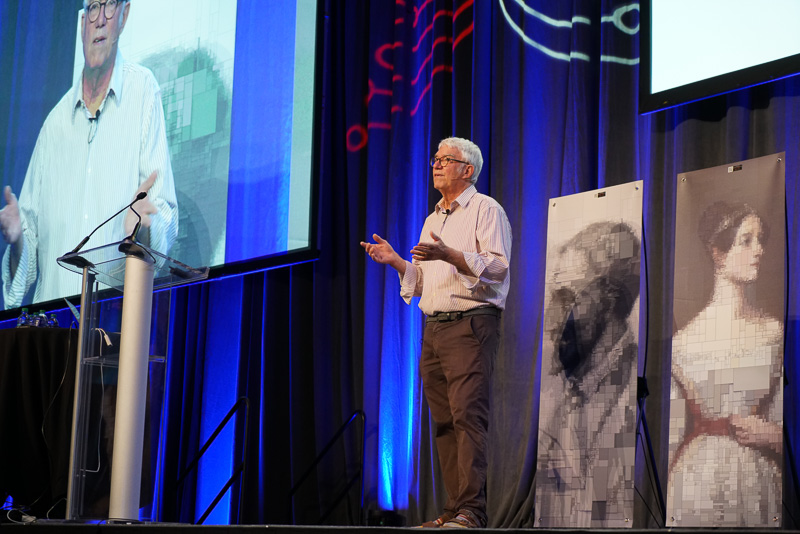
The performance went over okay, although it seemed like the audience couldn’t necessarily tell when I was joking. Maybe because so many were foreign.
Later in the con, after my talk, a taciturn young Swedish hacker came up to me. His expression was one of wild surmise. “Is it true you are descended from Hegel?” he asked. “Yes,” I answer, “he’s my great great great grandfather.” Long pause. The boy is staring at me wide-eyed. “Satoshi was very interested in the ideas of Hegel.” Fever pitch of intense staring. It clicks. He thinks I’m Satoshi. “No, I’m not him,” I say, and walk off—before he can hit me up for a billion dollars. But who knows if he believed my denial.
Wait—what am I talking about? Who’s Satoshi Nakamoto? This is a great story. Satoshi Nakamoto invented the first big cryptocurrency, Bitcoin, which is based on a blockchain technology, which Satoshi also described. All this was in Satoshi’s nine-page article, also known as his white paper, or as “Bitcoin: A Peer to Peer Electronic Cash System.” It’s worth reading or at least looking at.
The kicker is that Satoshi probably made something like three billion dollars by having written this short paper. He or she owned some of the earliest Bitcoin, the value went up, voila. And if Satoshi is now dead, the money has gone to his or her heirs.
Note that “Satoshi Nakamoto” is a pseudonym, and nobody is quite sure who he or she or they is or are or was. Why the anonymity? Well…if you’ve invented an untraceable currency that earns you three billion, you’re not exactly going to announce yourself to the IRS!
No Bitcoin for me, sigh. But, yes, pass the liquid democracy.
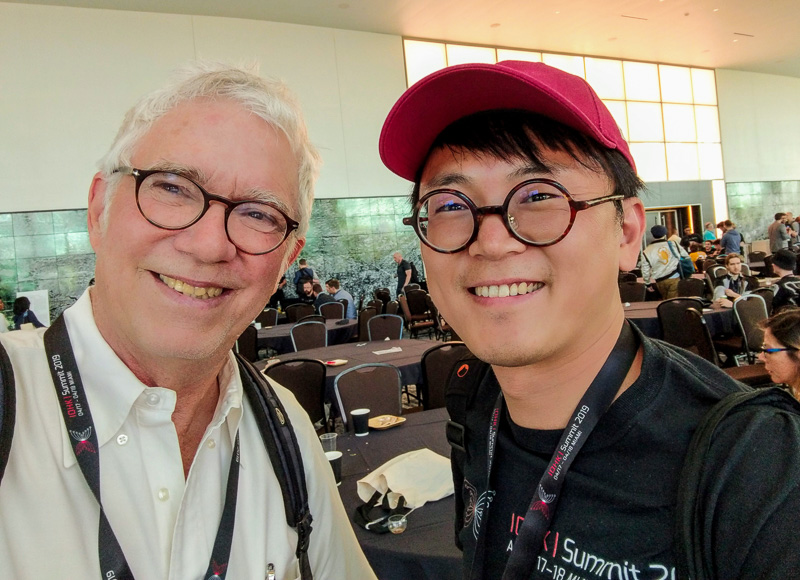
After the talk I met a young programmer guy from Shanghai, Lei Hao. He told me that my science fiction is very popular in China. I’d never heard about this. “Your novel Postsingular,” said Lei . “The programmers took turns translating of it into Chinese, working on it in their spare time.” “Pirated?” I said. “You said it was Creative Commons for free use,” countered Lei. “And we’re all reading it.” So that’s good. He says maybe he can get some legit editions into print there.
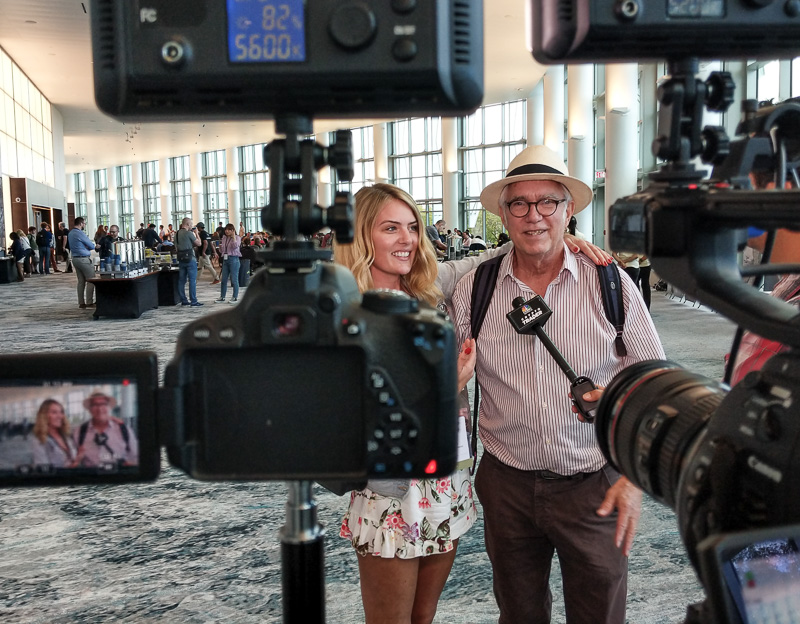
After the talk some lively and beautiful women approached me for video interviews. Like I was cool. They didn’t seem to be computer scientists.
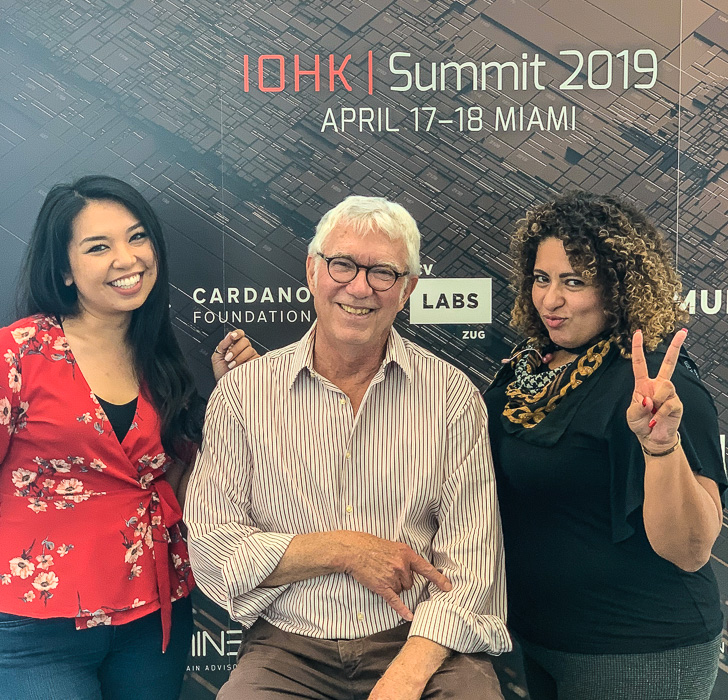
There’s a kind of louche buzz around the whole cryptocurrency thing, with nobody saying exactly what they want to use it for.
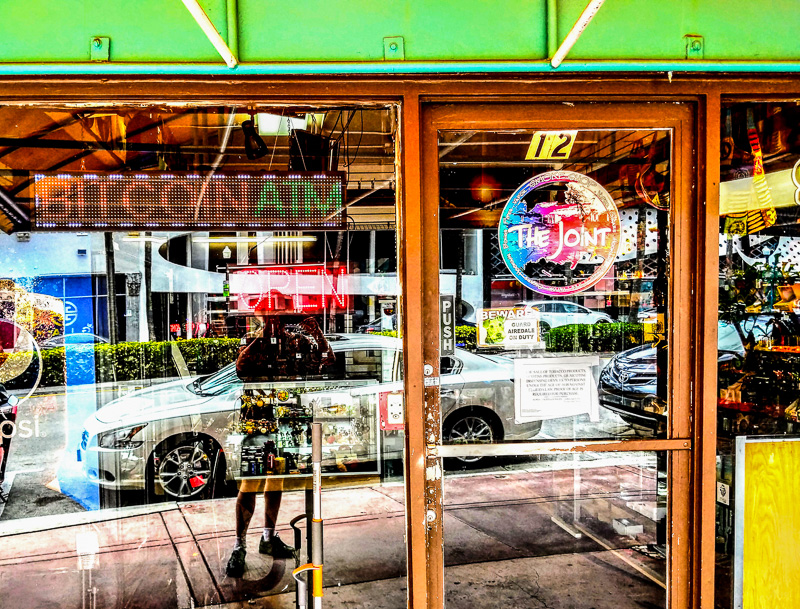
I noticed a Bitcoin ATM machine in…a pot store in Miami Beach. Just sayin’

It was fun walking around Miami Beach. People wore extremely theatrical and revealing clothes.
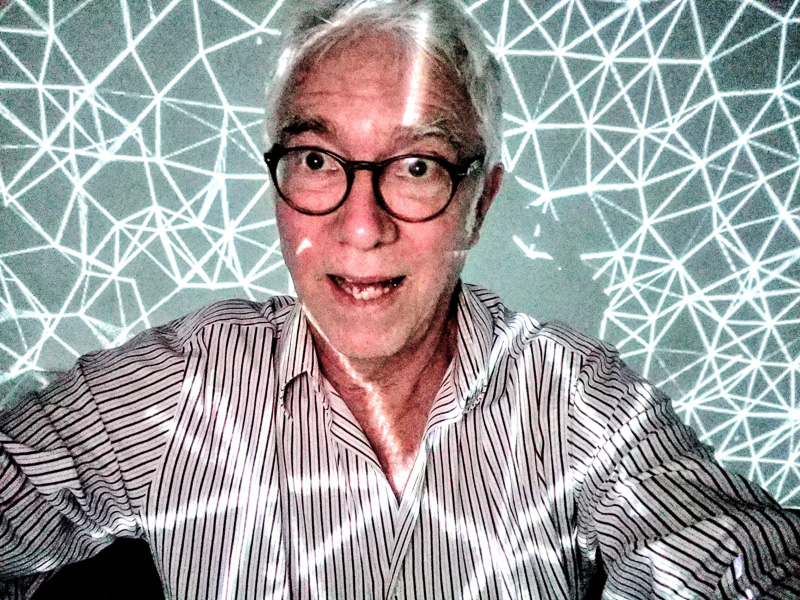
Sylvia and I happened on a cool storefront video art museum on Collins St. near 3th in South Beach, it was called…well, I don’t remember. Art House? It’s great.
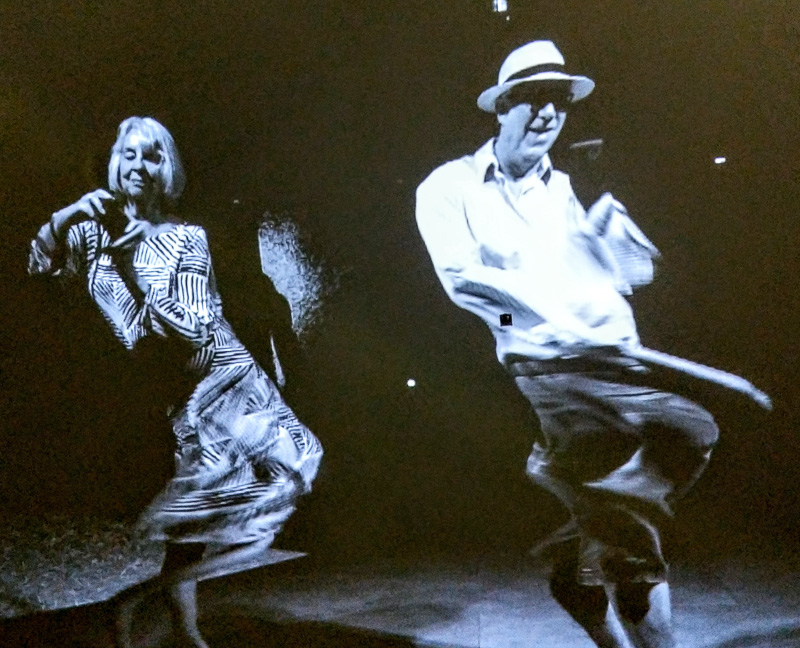
We were in these realtime computer sims.

The South Beach Art Deco houses are another big thing. Dig the rectangular bricks. Calm neighborhood, lots of trees, not super ritzy. “The Jews built these houses when they moved down here from New York after the War,” a foreign guy on the street told me. Everyone’s foreign in Florida, right.
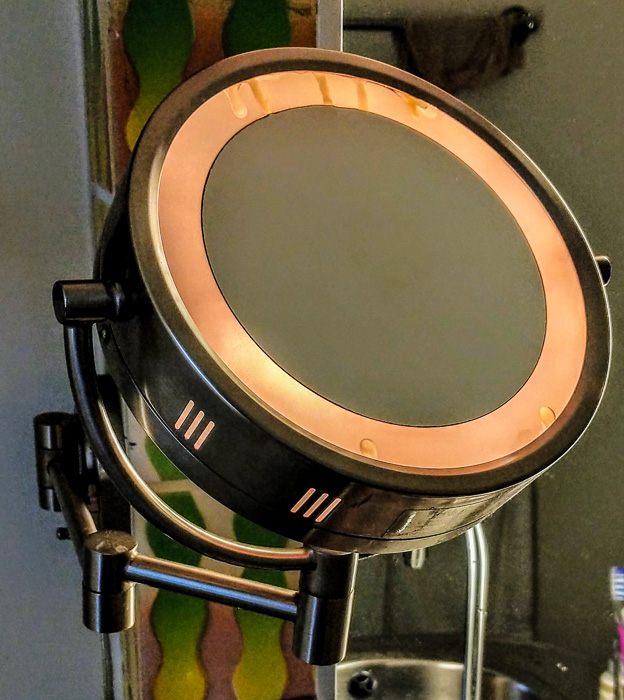
We stayed in a hotel that used to be called the Tiffany, but is now (doh) called “The Hotel @800.” Our room was wonderfully deco. This object is a make-up mirror. Like from Captain Nemo’s submarine.

Florida thunderstorm in the night, so romantic.
Looking at rain on a windowpane always reminds me of Wolfram’s Principle of Universal Computation—which he discussed at his IOHK talk. His Principle says that any nontrivial natural process can be viewed as a universal computation that is, in theory, capable of emulating any other computation at all. Now consider the computations inherent in our vaunted smart brains. There may be equally rich computations inherent in the weather system, or the ecology of a forest, or the flow of a waterfall, or in the flames of a fire. So even our smartness doesn’t make us unique. Nothing about humanity is unique. And looking for extraterrestrial aliens is a quixotic endeavor. We’ve got zillions of “alien intelligences” inherent in the natural processes all around us here on Earth.
To really make his idea hit home, Wolfram said something like this. “Suppose that we find ways to encode human minds in software. These coded processes are like souls. And perhaps at the end of time, there will be a box with ten trillion human souls in it. Now suppose someone looks at the box from the outside. There’s really no objective difference between this box, and a box with turbulent water in it, or a box that’s simply a block of stone, with the atoms vibrating and endlessly interacting. Every time that humans have thought they were special, or at the center of things—they’ve been wrong. We thought consciousness was special, but it’s not.”
Yah, mon. Pass the Bitcoin bong.

The Hotel’s lobby. Love round Deco windows.
In my IOHK talk, I speculated how it would be if every smart phone had a superchip instead of Google. Or, go quantum computer. The device could be very small. Call it a crystal ball. I think of. Borges’ story, “The Alef.” Now, of course Google has giant banks of computers worldwide. But we do a Moore’s Law move. In ten years you can fit all of Google’s current info and processing into your phone. The power of a search engine like Google stems from the users’ need to employ search as an index or catalog of the web. A company like Google is doing massive updates daily or hourly. Suppose everyone has a crystal ball. We enrich our crystal ball’s history automatically as we surf the web. And we share our updates peer to peer. It’s like Wikipedia. A blockchain element akin to the Wikipedia edit tracker to prevent spam updates.
Yadda yadda.

And, there, at the curb, a canary yellow old Chevy. What more do you need? [Late breaking input from Chris Noto. That’s not a Chevy, it’s a 1955 Oldsmobile 88, worth upwards of $20 grand. Can I pay in BitCoin?]
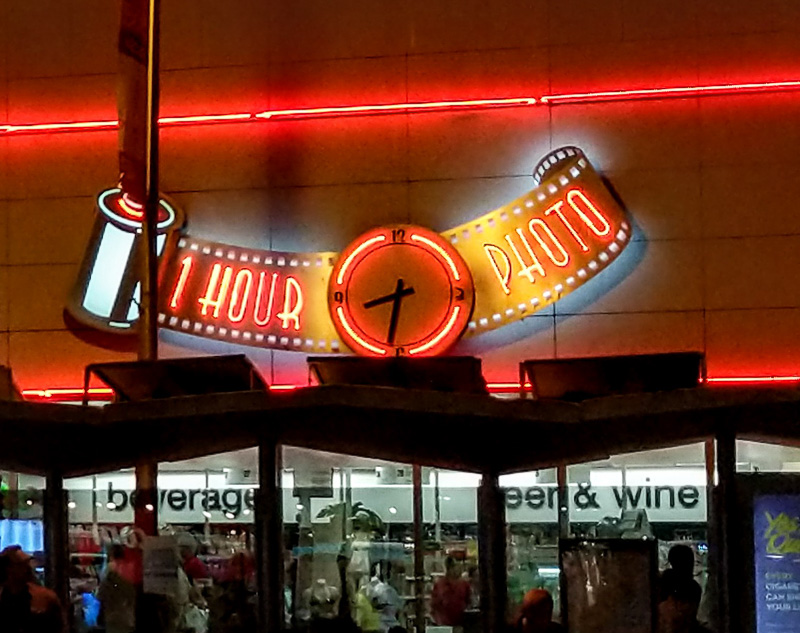
Neon. Those strands of human soul.








